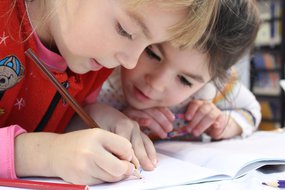
National Literacy Trust research shows that children who enjoy reading are three times more likely to have good mental wellbeing than children who don’t enjoy reading.
The report, based on a survey of almost 50,000 UK school children aged 8 to 18, found that:
- Children who are the most engaged with reading and writing are much happier with their lives than children who are the least engaged
- As children transition from primary to secondary school, their levels of literacy engagement and mental wellbeing both decline and continue on this downward path
- Boys who are the most engaged with reading and writing have higher levels of mental wellbeing than girls who are engaged
We have worked with children’s mental health charity, Place2Be, to develop a series of free wellbeing-themed teaching resources for primary schools, secondary schools and parents.
The resources include:
Primary schools
- A wellbeing assembly PowerPoint
- Teachers' notes to help you deliver the assembly
- A book list with titles for children organised in age ranges 0-3, 3-5, 5-7 and 7-11, including:
- Yoga Babies by Fearne Cotton
- Me and My Fear by Francesca Sanna
- The Goldfish Boy by Lisa Thompson
Secondary schools
- A wellbeing assembly PowerPoint
- Teachers' notes to help you deliver the assembly
- A book list including titles for children which includes young adult titles, including:
- Wonder by R J Palacio
- Mind Your Head by Juno Dawson
- Blame My Brain by Nicola Morgan
Parents
- Top tips for parents to help their children have a happy and healthy outlook on life
- A book list with books for all ages including very young children
- More activities, book suggestions and tips on Words for Life